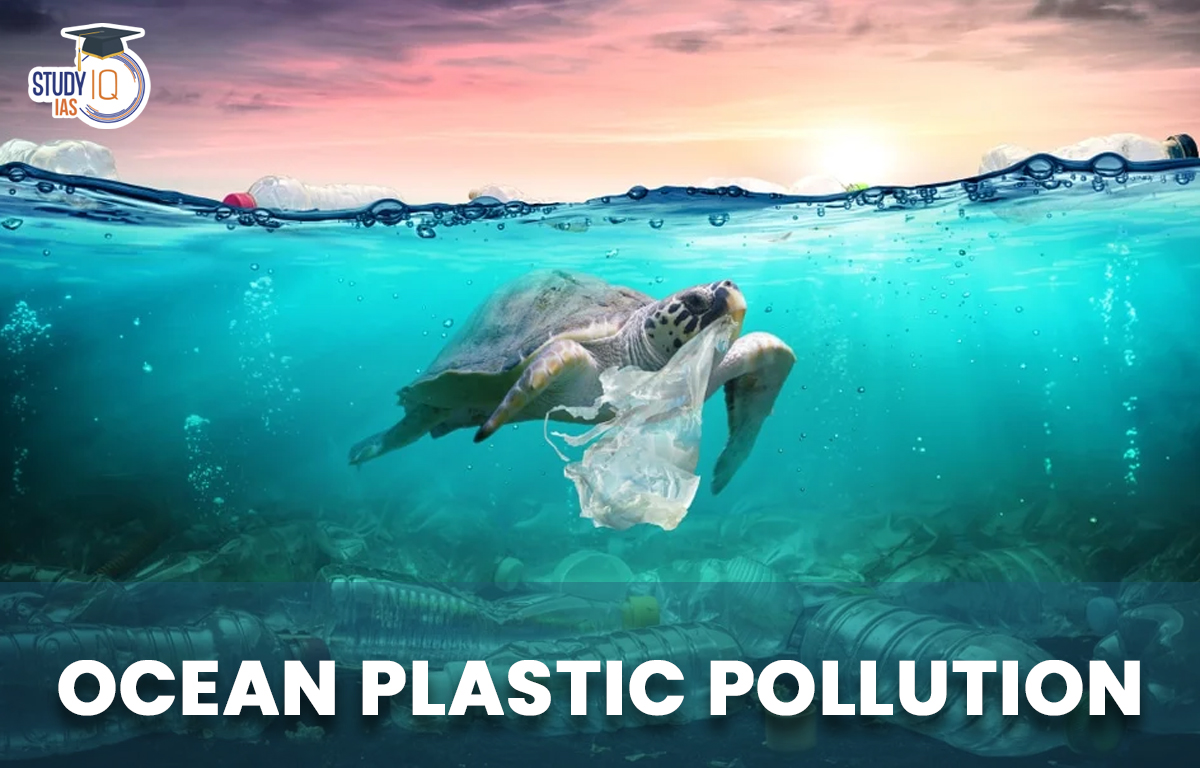Table of Contents
Context: A new study estimates 170 trillion plastic particles, weighing about 2 million metric tons, are currently afloat in the world’s oceans.
Decoding the News
- The study adds that this number could nearly triple by 2040 if no steps are taken to clean up the world’s oceans.
- There were estimated 5 trillion plastic particles in the ocean in 2014. Within the next 10 years, the estimation is 170 trillion.
- Most of these plastic particles found floating on the ocean’s surface are microplastics.

The Study
- Methodology: Researchers analyzed surface-level plastic pollution data from nearly 12,000 ocean stations in six major marine regions, from 1979 to 2019. This was combined with data collected by them during their own expeditions.
- They used computer modeling to estimate not only how much microplastic currently exists in the oceans but also how their concentration has varied over the years.
- Findings: Between 1990 and 2005, the number of plastic particles more or less fluctuated, which could be due to the effective implementation of important policy measures.
- Since 2005, the plastic production skyrocketed, and with more plastic there is more pollution. Old rules are not enough to thwart plastic pollution.
- In absence of any drastic action about the issue, there will be a 2.6-fold increase in plastic flowing into aquatic environments by 2040.

Impact of Plastic Pollution in Oceans
- Marine ecology: Plastic debris present in the oceans leads to ingestion, suffocation and entanglement of hundreds of marine species.
- Food security: Oceans are one of the major sources of food for a large population. Plastics ingested by marine organisms can enter human body, affecting their health.
- Economic impact: The income generated through marine tourism gets affected as plastics discourage visitors. Fishing income also gets drastically reduced.
- Accelerate climate change: Plastic in the oceans interferes with the oceans capacity to absorb and sequester carbon dioxide, accelerating climate change.
Limiting Plastic Pollution in Oceans
- Global binding practices: There is an urgent need to implement a global measure to limit the production of single-use, throwaway plastic.
- Effective waste management: Urban areas must implement better waste management practices so that plastic waste produced do not leave their territory.
- Reduce chemical additives: Plastic producers must reduce chemical additives in plastic so that they do not harm ocean organism due to leaching.
- Recycling policy: Producers must take more responsibility when it comes to recycling plastic waste generated. This will reduce the amount that is discarded.
- Legally binding rules can be made commit industries to use 75% recycled plastic in any new product.
Microplastics in Oceans
- Microplastics are tiny plastic particles that measure less than 5mm in diameter. They are especially harmful to the oceans as they do not easily break down into harmless molecules.
- Microplastics adversely affect the health of marine organisms, which mistake plastic for food. They can trigger loss of biodiversity and threaten ecosystem balance.
- Impact on Marine life
- Health of marine organisms: Studies have detected microplastics in marine organisms, from phytoplankton to whales and dolphins, which have proven hazardous for them.
- Microplastics absorb many hydrophobic compounds, such as DDT, PCBs and other industrial chemicals, and these chemicals can be released when ingested.
- Carbon cycle: Phytoplanktons absorb atmospheric carbon and are eaten by zooplankton, whose carbon excretion sink to the sea floor in the form of faecal pellets and get mineralized without escaping into atmosphere.
- Microplastics prevent the faecal pellets from sinking to the ocean floor, allowing carbon to be either ingested or emitted back into the atmosphere.
- Health of marine organisms: Studies have detected microplastics in marine organisms, from phytoplankton to whales and dolphins, which have proven hazardous for them.


 Accredited Social Health Activists (ASHA...
Accredited Social Health Activists (ASHA...
 World’s 1st Unique Q-Shield Platform a...
World’s 1st Unique Q-Shield Platform a...
 IB ACIO Recruitment Notification 2025 Ex...
IB ACIO Recruitment Notification 2025 Ex...





















